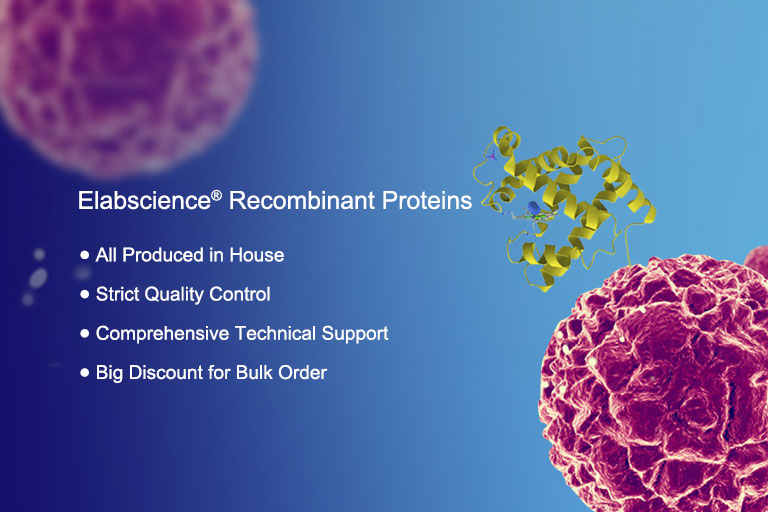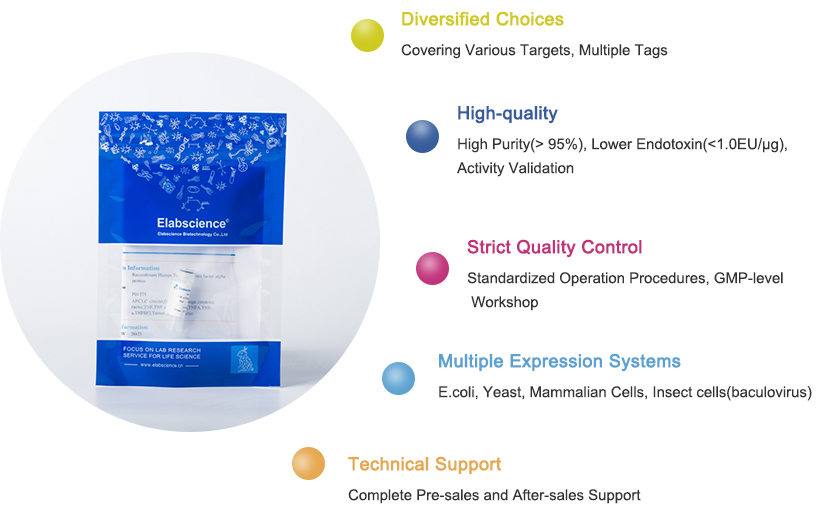
×

Recombinant protein is a manipulated form of protein produced through recombinant DNA technology. By inserting the DNA encoding the protein into bacterial or mammalian cells, we can get quantities of target proteins after amplifying expression and purification. Elabscience® offers a diverse selection of more than 4000 proteins for your research, including cytokines, growth factors, immune checkpoint proteins, CD antigen, FC Receptor, enzymes, hormone, etc.
If you want to browse all recombinant proteins, Click Here to Check
Elabscience® also provides Protein Expression and Purification Services, Peptide Synthesis Service to help you obtain the protein that is not in the catalog.

Elabscience® offers over 1000 different active proteins ready for experimental usage. There are a wide range of biological assay methods to measure the bioacitivity of a recombinant protein, including proliferation assay, cytokine induction assay, chemotaxis assay, cell proliferation assay, enzyme assay, funtional ELISA , etc. The recombinant proteins that validated bioactivity are available for cell culture, drug target research, candidate drugs, structural study, protein-protein interaction study and many other research fields.

Jurkat were left untrated (left) or treated with 1 μM Camptothecin treated for 4 h (right) and then stained using Annexin V-APC. The combination of Annexin V(PKSH033460), APC labeled allows for the distinction between apoptotic cells (Annexin V-APC positive) and viable cells (unstained).

Recombinant human IL-6(PKSH033611) was measured in a cell proliferation assay using TF‑1 human erythroleukemic cells. The ED50 for this effect is 20-100pg/ml.
Elabscience® Cytokines are small secreted proteins released by immune cells that serve to regulate the immune system, which involve in autocrine, paracrine and endocrine signaling, also regulate the maturation, growth and responsiveness of various cell types. Elabscience® provides a comprehensive catalog of recombinant cytokines with excellent lot-to-lot consistency, superior activity and significantly low endotoxin levels, including Chemokines, Interferons(IFNs), Interleukins, and Tumour Necrosis Factors(TNFs), Cylony Stimulating Factors(CSFs), Growth Factors and Other Cytokine-Related Proteins.

Immune checkpoints are regulators of the immune activation. They consist of stimulatory and inhibitory pathways that maintain self-tolerance and assist with immune response. Stimulatory Immune checkpoints augment immunological responses against pathogens. On the contrary, inhibitory Immune checkpoints negatively regulate T-cell activation. In cancer, immune checkpoint mechanisms are often activated to suppress the nascent anti-tumor immune response, and PD-1, PD-L1, CTLA-4, CD28, OX40 are hot targets for cancer immunotherapy.
